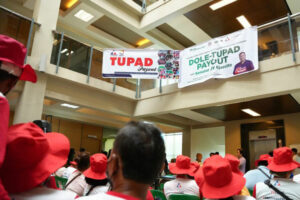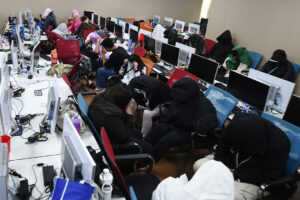Gov’t urged to make TUPAD a public jobs program

THE GOVERNMENT needs to convert its displaced-worker aid initiative, known as TUPAD (Tulong Panghanapbuhay sa Ating Disadvantaged/Displaced Workers) into a public jobs program, labor analysts said.
Benjamin B. Velasco, an assistant professor at the University of the Philippines Diliman School of Labor and Industrial Relations, said TUPAD needs to become a hiring program providing paid work to the unemployed for at least 100 days per year.
“Instead of street sweeping, (the government should prioritize) green jobs such as tree planting, river and beach cleanups,” Mr. Velasco said via Facebook chat.
TUPAD was designed a community-based safety net scheme that provides temporary employment to the unemployed, the underemployed, and seasonal workers.
He added that relying on the so-called gig economy of virtual assistants, food delivery riders, and home-based work produces “different forms of underemployment with precarious incomes and little in labor standards and social protection. (It) does not provide a pathway out of underemployment.”
Mr. Velasco said the Philippines needs an industrial policy or state-led program to develop designated industries to improve job quality.
He added that another pathway to improving job quality is strengthening skills training through the Technical Education and Skills Development Authority.
The unemployment rate inched up to 3.9% in March, equivalent to 1.93 million jobless.
The government’s Trabaho Para sa Bayan (TPB) Plan is a 10-year roadmap that aims to increase the labor force participation rate to 68.2% by 2034.
Labor Secretary Bienvenido E. Laguesma said via Viber that the TPB Plan will address labor market inefficiencies like education-job mismatches, skills-job mismatches and geographical mismatches.
He added that an interagency council will oversee the implementation of the plan “which will also address the issue of underemployment and unemployment, among others.”
“The rise in the underemployment rate is likewise indicative that there are work or jobs available, but the challenge is to have quality jobs or jobs that are more permanent and full-time,” Mr. Laguesma said.
Federation of Free Workers President Jose G. Matula said job quality is deteriorating as “more workers are not earning enough or are in jobs that do not match their qualifications.”
“Underemployment and low wages are silent crises. The solution is not just creating jobs — but ensuring they are dignified, secure, and sufficient to sustain families,” Mr. Matula said in a Viber message.
He added that government must also allocate a P100 billion stimulus to fund micro, small, and medium enterprises giving access to capital, wage subsidies, and digitalization support.
He said that the government should substantially raise wages nationwide, through the implementation of a P200 legislated wage hike.
“A P200 daily wage increase will not only address the gap between income and rising cost of living, but also serve as an economic stimulus by boosting consumer demand and circulation of money in the economy,” Mr. Matula said.
Last year, the Senate approved a bill for a P100 daily wage increase for all minimum wage earners in the private sector, regardless of region or industry.
On the other hand, the House of Representatives, last January, endorsed a consolidated bill proposing a P200 across-the-board daily wage increase for private sector workers. — Adrian H. Halili




